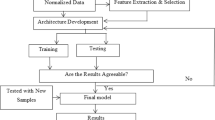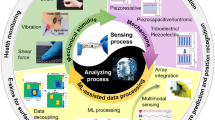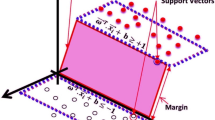Abstract
This article mainly focuses on the preprocessing method of medical heterogeneous equipment health data sources and the performance measurement of single-layer perceptron network intelligent computing. It structures a data quality evaluation system of medical heterogeneous equipment with five different dimensions: patient personal information, medical basic data, medical testing data, medical treatment data and medical device data. An innovative preprocessing algorithm of data sources is proposed to study the missing data, the error data, the repetition data and the validity data. By constructing a single-layer perceptron network, accuracy, misjudgment rate, precision, recall, true positive rate and false positive rate in intelligent computing are studied, and the corresponding mathematical calculation formulas are established. In the application research, this article collected 157 original data from a medical institution. The algorithm is applied and the models are tested. The research solved the problems of intelligent computing performance measurement of heterogeneous devices based on single-layer perceptron network.







Similar content being viewed by others
Data availability
The data in this paper are from the Guangdong Second Provincial General Hospital, China. However, because the patients are protected by law in China, the data cannot be provided to any third party.
References
Kahn, M. G., Raebel, M. A., Glanz, J. M., Riedlinger, K., & Steiner, J. F. (2012). A Pragmatic Framework for Single-site and Multisite Data Quality Assessment in Electronic Health Record-based Clinical Research. Medical Care, 50. Retrieved from https://journals.lww.com/lww-medicalcare/Fulltext/2012/07001/A_Pragmatic_Framework_for_Single_site_and.8.aspx
Weiskopf NG, Hripcsak G, Swaminathan S, Weng C (2013) Defining and measuring completeness of electronic health records for secondary use. J Biomed Inform 46(5):830–836
Reimer AP, Milinovich A, Madigan EA (2016) Data quality assessment framework to assess electronic medical record data for use in research. Int J Med Inform 90:40–47
Estiri H, Stephens KA, Klann JG, Murphy SN (2017) Exploring completeness in clinical data research networks with DQe-c. J Am Med Inform Assoc 25(1):17–24
Rajan NS, Gouripeddi R, Mo P, Madsen RK, Facelli JC (2019) Towards a content agnostic computable knowledge repository for data quality assessment. Comput Methods Programs Biomed 177:193–201
Naik S, Voong S, Bamford M, Smith K, Joyce A, Grinspun D (2020) Assessment of the nursing quality indicators for reporting and evaluation (NQuIRE) database using a data quality index. J Am Med Inform Assoc 27(5):776–782
Schmidt CO, Struckmann S, Enzenbach C, Reineke A, Stausberg J, Damerow S, Richter A (2021) Facilitating harmonized data quality assessments. A data quality framework for observational health research data collections with software implementations in R. BMC Med Res Methodol 21(1):63
Wang C, Ma K (2008) A statistical approach to volume data quality assessment. IEEE Trans Visual Comput Graph 14(3):590–602
Batini C, Cappiello C, Francalanci C, Maurino A (2009) Methodologies for data quality assessment and improvement. ACM Comput Surv 41(3):52
Woodall P, Borek A, Parlikad AK (2013) Data quality assessment: the hybrid approach. Inf Manag 50(7):369–382
Ardagna D, Cappiello C, Samá W, Vitali M (2018) Context-aware data quality assessment for big data. Futur Gener Comput Syst 89:548–562
Peng M, Sundararajan V, Williamson T, Minty EP, Smith TC, Doktorchik CTA, Quan H (2018) Exploration of association rule mining for coding consistency and completeness assessment in inpatient administrative health data. J Biomed Inform 79:41–47
Cichy C, Rass S (2019) An overview of data quality frameworks. IEEE Access 7:24634–24648
Bian J, Lyu T, Loiacono A, Viramontes TM, Lipori G, Guo Y, Hogan W (2020) Assessing the practice of data quality evaluation in a national clinical data research network through a systematic scoping review in the era of real-world data. J Am Med Inform Assoc 27(12):1999–2010
Jarwar MA, Chong I (2020) Web objects based contextual data quality assessment model for semantic data application. Appl Sci 10(6):2181
Urbaniak I, Wolter M (2021) Quality assessment of compressed and resized medical images based on pattern recognition using a convolutional neural network. Commun Nonlinear Sci Numer Simul 95:105582
Tarle B, Chintakindi S, Jena S (2020) Integrating multiple methods to enhance medical data classification. Evol Syst 11(1):133–142
Ma L, Yang T (2021) Construction and evaluation of intelligent medical diagnosis model based on integrated deep neural network. Comput Intell Neurosci 2021:7171816
Chen H, Chen J, Ding J (2021) Data evaluation and enhancement for quality improvement of machine learning. IEEE Trans Reliab 70(2):831–847
Shi PY, Hou F, Zheng XW, Yuan F (2020) Analysis of electronic health records based on long short-term memory. Concurr Comput-Pract Exp 32(14):5684
Pan Q, Huang C, Chen D (2021) A method based on multi-standard active learning to recognize entities in electronic medical record. Math Biosci Eng 18(2):1000–1021
Huang Y-P, Singh A, Liu S-I, Wu S-I, Quoc HA, Sereter A (2018) Developing transformed fuzzy neural networks to enhance medical data classification accuracy. Int J Fuzzy Syst 20(6):1925–1937
Pang S (2005) Credit scoring models and the predicting models in stock market––approach of statistics, neural network and support vector machine. Science Press, Beijing ((In Chinese))
Zou Z. (2016) Machine learning. Tsinghua university press (In Chinese)
Acknowledgements
The major science and technology project of Guangzhou’s R & D plan in key areas is “Guangzhou national new generation artificial intelligence innovation and development pilot zone artificial intelligence social experiment unveiling project” (Guangzhou 2022-06-01).
Author information
Authors and Affiliations
Corresponding author
Ethics declarations
Conflicts of interest
The authors declare no conflict of interest.
Additional information
Publisher's Note
Springer Nature remains neutral with regard to jurisdictional claims in published maps and institutional affiliations.
Rights and permissions
Springer Nature or its licensor (e.g. a society or other partner) holds exclusive rights to this article under a publishing agreement with the author(s) or other rightsholder(s); author self-archiving of the accepted manuscript version of this article is solely governed by the terms of such publishing agreement and applicable law.
About this article
Cite this article
Qu, H., Lian, W., Pang, S. et al. Five-dimensional evaluation system and perceptron intelligent computing performance measurement methods based on medical heterogeneous equipment health data. Neural Comput & Applic 35, 24651–24664 (2023). https://doi.org/10.1007/s00521-023-08316-3
Received:
Accepted:
Published:
Issue Date:
DOI: https://doi.org/10.1007/s00521-023-08316-3




